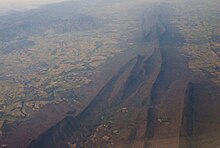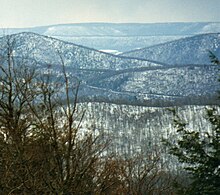Ridge-and-Valley Appalachians

The Ridge-and-Valley Appalachians, also called the Ridge and Valley Province or the Valley and Ridge Appalachians, are a physiographic province of the larger Appalachian Highlands division. The physiographic province is divided into three sections: the Hudson Valley, the Central, and the Tennessee.[1]
The river valleys were areas of indigenous settlements for thousands of years. In the historic period, the Cherokee people had towns along many of the rivers in western South Carolina and North Carolina, as well as on the western side of the Appalachian Mountains in present-day Tennessee. Similarly, the Catawba people occupied areas along the upper Catawba River in Western North Carolina, to the east of Cherokee County.
The ridge and valley system presents an important obstacle to east–west land travel even with today's technology. It was a nearly insurmountable barrier to European-American migrants who walked or rode horses traveling west to settle the Ohio Country, and later the Northwest Territory and Oregon Country. In the era when animal power dominated transportation, there was no safe way to cross east–west in the middle of the range; crossing was only possible nearer its extremes except for a few rough passages opened mid-range during the colonial era, including Cumberland Gap, Braddock's Road, and Forbes Road.
These were later improved as America's first National Roads, including Wilderness Road, Cumberland Road, Lincoln Highway, designated as U.S. Route 40 and U.S. Route 30 in later years. Early settlers of Ohio Country tended to enter it via the Ohio River; river systems were the most important transportation corridors. It was difficult in the late 19th and 20th centuries to construct railroads and modern highways through this area.
Geography
[edit]
The eastern head of the Ridge and Valley region is marked by the Great Appalachian Valley, which lies just west of the Blue Ridge. The western side of the Ridge and Valley region is marked by steep escarpments such as the Allegheny Front, the Cumberland Mountains, and Walden Ridge. The Valley and Ridge is located on the west side of the Blue Ridge Mountains.

The Province extends from southeastern New York in the north through northwestern New Jersey, westward into Pennsylvania through the Lehigh Valley, and southward into Maryland, West Virginia, Virginia, Kentucky, Tennessee, Georgia, and Alabama. They form a broad arc between the Blue Ridge Mountains and the Appalachian Plateau physiographic province, which includes the Allegheny and Cumberland plateaus. They are characterized by long, even ridges, with long, continuous valleys in between.
Significant ridges (from north to south)
[edit]| Name | State |
|---|---|
| Shawangunk Ridge | New York |
| Kittatinny Mountain | New Jersey |
| Bald Eagle Mountain | Pennsylvania |
| Blue Mountain | Pennsylvania |
| South Mountain | Pennsylvania |
| Jacks Mountain | Pennsylvania |
| Moosic Mountains | Pennsylvania |
| Nittany Mountain | Pennsylvania |
| Tuscarora Mountain | Pennsylvania |
| Tussey Mountain | Pennsylvania |
| Wills Mountain | Pennsylvania and Maryland |
| Dans Mountain | Maryland |
| Sideling Hill | West Virginia, Maryland, and Pennsylvania |
| Cacapon Mountain | West Virginia |
| Knobly Mountain | West Virginia |
| Mill Creek Mountain | West Virginia |
| New Creek Mountain | West Virginia |
| North Fork Mountain | West Virginia |
| Patterson Creek Mountain | West Virginia |
| Sleepy Creek Mountain | West Virginia |
| South Branch Mountain | West Virginia |
| Spruce Mountain | West Virginia |
| Allegheny Mountain | Virginia and West Virginia |
| Great North Mountain | Virginia and West Virginia |
| North Mountain | Virginia and West Virginia |
| Shenandoah Mountain | Virginia and West Virginia |
| Massanutten Mountain | Virginia |
| Pine Mountain | Kentucky, Virginia, and Tennessee |
| Clinch Mountain | Tennessee and Virginia |
| Powell Mountain | Tennessee and Virginia |
| Bays Mountain | Tennessee |
| House Mountain | Tennessee |
| Sharp's Ridge | Tennessee |
| Taylor Ridge (Georgia) | Georgia |
| Johns Mountain | Georgia |
| Lavender Mountain | Georgia |
| White Oak Mountain | Tennessee and Georgia |
| Missionary Ridge | Tennessee and Georgia |
| Stringer's Ridge | Tennessee |
| Cheaha Mountain | Alabama |
| Red Mountain | Alabama |



Geology
[edit]The Valley and Ridge Province was formed during the Alleghanian orogeny, a mountain-building event that occurred between 325 and 260 million years ago.[2] The rocks in the region were subjected to immense pressure and heat, causing them to deform and fold. The softer parts of these rock units (chiefly shale and limestone) were eroded to form the valleys and the harder parts of the folds (quartzites) formed the mountain tops and ridges.[3] The ridges represent the edges of the erosion-resistant strata, and the valleys portray the absence of the more erodible strata. Smaller streams have developed their valleys following the lines of the more easily eroded strata.[4][5]


A few major rivers, including the Delaware River, the Susquehanna River, the New River, and the Potomac River, are older than the present mountains, having cut water gaps that are perpendicular to hard strata ridges. The evidence points to a wearing down of the entire region to a low level with little relief, so that major rivers were flowing in unconsolidated sediments unaffected by the underlying rock structure. The region was then uplifted slowly enough so that the rivers could maintain their course, cutting through the ridges as they developed.
Valleys in the region are either synclinal or anticlinal.
These mountains are at their development in central Pennsylvania, a phenomenon termed the Pennsylvania climax.
See also
[edit]- Allegheny Front
- Eastern Continental Divide
- Geology of the Appalachians
- Tennessee Valley Divide
- Tennessee Frontiers: Three Regions in Transition by John R. Finger
References
[edit]- ^ "Physiographic divisions of the conterminous U. S." water.usgs.gov. Retrieved September 6, 2023.
- ^ Hatcher, R.D. "Tracking lower-to-mid-to-upper crustal deformation processes through time and space through three Paleozoic orogenies in the Southern Appalachians using dated metamorphic assemblages and faults". Geological Society of America Abstracts with Programs. Geological Society of America. Archived from the original on August 6, 2018. Retrieved January 23, 2012.
- ^ Stanley, 421-2
- ^ Stanley, 421-2
- ^ "Valley and Ridge Province (U.S. National Park Service)". www.nps.gov. Retrieved September 6, 2023.
Further reading
[edit]- WPA, Kentucky: A Guide to the Bluegrass State (1939); classic guide from the Federal Writers Project; covers main themes and describes every town and feature, with capsule histories online
- Stanley, Steven M. Earth System History. New York: W.H. Freeman and Company, 1999. ISBN 0-7167-2882-6
- Eastern United States
- Geography of Appalachia
- Geography of the Lehigh Valley
- Physiographic provinces
- Physiographic regions of the United States
- Regions of Alabama
- Regions of Georgia (U.S. state)
- Regions of Kentucky
- Regions of New York (state)
- Regions of Ohio
- Regions of Maryland
- Regions of New Jersey
- Regions of Pennsylvania
- Regions of Tennessee
- Regions of Virginia
- Regions of West Virginia
- Ridges of Alabama
- Ridges of Georgia (U.S. state)
- Ridges of Kentucky
- Ridges of Maryland
- Ridges of New Jersey
- Ridges of New York (state)
- Ridges of Pennsylvania
- Ridges of Tennessee
- Ridges of the United States
- Ridges of Virginia
- Ridges of West Virginia
- Subranges of the Appalachian Mountains
- Valleys of the United States
